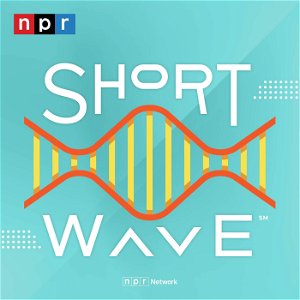
A silky shark named Genie traveled from the Galapagos Islands out to the open ocean and back – over 17,000 miles – over the course of a year and a half. That's an average of 31 miles per day, making Genie's journey the longest recorded migration for a silky shark. Marine scientist Pelayo Salinas de León and his team named Genie in honor of the late marine biologist Eugenie Clark – also known as "The Shark Lady." She devoted her life to the study of sharks and to improving their reputation. Have another story you want us to cover? Email us at shortwave@npr.org. Learn more about sponsor message choices: podcastchoices.com/adchoices NPR Privacy Policy

Humans rely on our symbiotic relationship with good microbes—in the gut, the skin and ... the vagina. Fatima Aysha Hussain studies what makes a healthy vaginal microbiome. She talks to host Emily Kwong about her long-term transplant study that asks the question: Can one vagina help another through a microbe donation? Have a human body question? Email us at shortwave@npr.org. Learn more about sponsor message choices: podcastchoices.com/adchoices NPR Privacy Policy

Each year 84,000 people in the U.S. are diagnosed with melanoma. About 90% of these skin cancers are linked to the ultraviolet radiation from the sun. Sunscreen does protect the skin, but dermatologists have found six very common mistakes people make when it comes to using it. NPR science correspondent Allison Aubrey talks to host Regina G. Barber about the science behind sunscreen and how to avoid making these mistakes this summer. They also get into which sunscreens may be better than others. Have other science stories you want us to cover? Email us at shortwave@npr.org. Learn more about sponsor message choices: podcastchoices.com/adchoices NPR Privacy Policy

Fibroids are benign uterine tumors. So why does it matter that the majority of people with a uterus will have one before they are 50 years old? Physician Rachell Bervell, founder of the Black OBGYN Project, explains that when symptoms arise, they can be quite serious — from extreme menstrual bleeding to fertility problems. Plus, why they're very likely to affect you or a loved one. Curious about other health issues? Email us at shortwave@npr.org. Learn more about sponsor message choices: podcastchoices.com/adchoices NPR Privacy Policy

Scientists are testing the limits of artificial intelligence when it comes to language learning. One recent challenge? Learning ... whale! Researchers are using machine learning to analyze and decode whale sounds — and it's just as complicated as it seems. Curious about other mysteries of nature? Email us at shortwave@npr.org. Learn more about sponsor message choices: podcastchoices.com/adchoices NPR Privacy Policy

Baobabs are sometimes called the "tree of life" with their thick trunks, crown of branches and flowers that only open at twilight. But theories about their geographic origin was divided among three places: the savannas of sub-Saharan Africa, the Kimberley region of western Australia and the dry forests of the island nation of Madagascar. To solve this mystery, a global research team led by scientists at the Wuhan Botanical Garden at the Chinese Academy of Sciences examined high-quality genomic data from all eight baobab species. Have another origin story you want us to cover? Email us at shortwave@npr.org.

Chocolate may never be the same. The majority of chocolate is made in just two countries and erratic weather from climate change is decreasing cocoa production. A handful of extreme weather events—from drought to heavy rainfall—could have lasting effects on the chocolate industry. Yasmin Tayag, a food, health and science writer at The Atlantic, talks to host Emily Kwong about the cocoa shortage: What's causing it, how it's linked to poor farming conditions and potential solutions. Plus, they enjoy a chocolate alternative taste test. Read Yasmin's full article. Have a food science story you want us to cover? Email us at shortwave@npr.org. Learn more about sponsor message choices: podcastchoices.com/adchoices NPR Privacy Policy

As artificial intelligence seeps into some realms of society, it rushes into others. One area it's making a big difference is protein science — as in the "building blocks of life," proteins! Producer Berly McCoy talks to host Emily Kwong about the newest advance in protein science: AlphaFold3, an AI program from Google DeepMind. Plus, they talk about the wider field of AI protein science and why researchers hope it will solve a range of problems, from disease to the climate. Have other aspects of AI you want us to cover? Email us at shortwave@npr.org. Learn more about sponsor message choices: podcastchoices.com/adchoices NPR Privacy Policy

Scientists at the National Oceanic and Atmospheric Administration observed a cluster of sunspots on the surface of the sun this week. With them came solar flares that kicked off a severe geomagnetic storm. That storm is expected to last throughout the weekend as at least five coronal mass ejections — chunks of the sun — are flung out into space, towards Earth! NOAA uses a five point scale to rate these storms, and this weekend's storm is a G4. It's expected to produce auroras as far south as Alabama. To contextualize this storm, we are looking back at the largest solar storm on record: the Carrington Event. Want us to cover more about the sun? Email us at shortwave@npr.org. Learn more about sponsor message choices: podcastchoices.com/adchoices NPR Privacy Policy

Sam and John Fetters, 19, are identical twins on different ends of the autism spectrum. Sam is a sophomore at Amherst College and runs marathons in his free time. John attends a school for people with special needs and loves to watch Sesame Street in his free time. Identical twins like Sam and John pose an important question for scientists: How can a disorder that is known to be highly genetic look so different in siblings who share the same genome? Check out more of NPR's series on the Science of Siblings. More science questions? Email us at shortwave@npr.org. Learn more about sponsor message choices: podcastchoices.com/adchoices NPR Privacy Policy

Emily gets super nerdy with former host Maddie Sofia get as they dive into the incredible world of nudibranchs in this encore episode. Not only are these sea slugs eye-catching for their colors, some of them have evolved to "steal" abilities from other organisms — from the power of photosynthesis to the stinging cells of their venomous predators. These sea slugs are going to blow your mind! You can email Short Wave at shortwave@npr.org. Learn more about sponsor message choices: podcastchoices.com/adchoices NPR Privacy Policy

It's not unusual for siblings to quibble over ownership of something — a cherished toy, a coveted seat in the car — or whose fault something is. If you're Mercedes Sheen, you not only spent your childhood squabbling with your sister over your memories, you then turn it into your research career. Mercedes studies disputed memories, where it's unclear who an event happened to. It turns out these memories can tell us a lot about people — they tend to be self-aggrandizing — and how the human brain remembers things. Check out more of NPR's series on the Science of Siblings. Curious about more science about memories? Email us at shortwave@npr.org. Learn more about sponsor message choices: podcastchoices.com/adchoices NPR Privacy Policy
Available on
Ratings

Reviews
Be the first to leave a review for this title